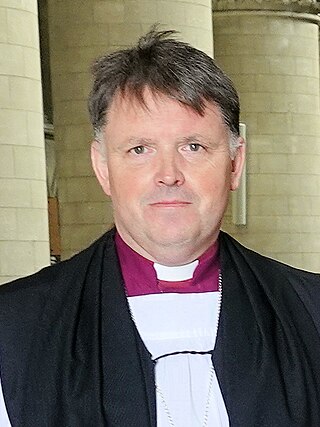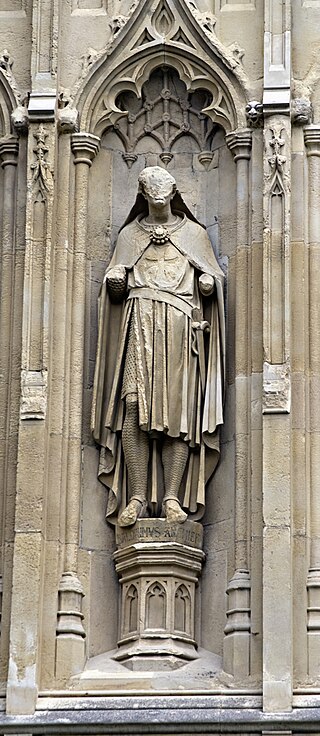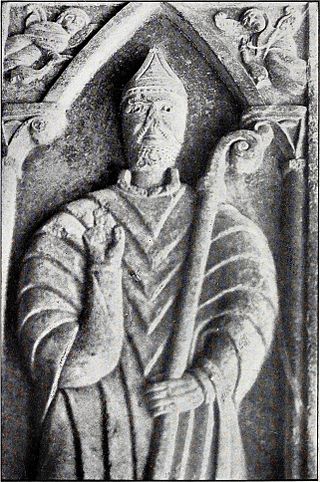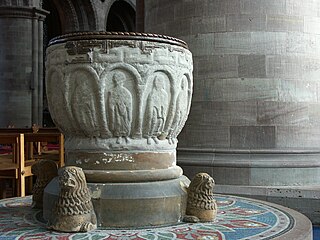Related Research Articles

Thomas Rotherham, also known as Thomas (Scot) de Rotherham, was an English cleric and statesman. He served as bishop of several dioceses, most notably as Archbishop of York and, on two occasions as Lord Chancellor. He is considered a venerable figure in Rotherham, South Yorkshire, his town of birth.

The Bishop of Norwich is the ordinary of the Church of England Diocese of Norwich in the Province of Canterbury. The diocese covers most of the county of Norfolk and part of Suffolk. The bishop of Norwich is Graham Usher.
Robert of Melun was an English scholastic Christian theologian who taught in France, and later became Bishop of Hereford in England. He studied under Peter Abelard in Paris before teaching there and at Melun, which gave him his surname. His students included John of Salisbury, Roger of Worcester, William of Tyre, and possibly Thomas Becket. Robert was involved in the Council of Reims in 1148, which condemned the teachings of Gilbert de la Porrée. Three of his theological works survive, and show him to have been strictly orthodox.

Thomas of Bayeux was Archbishop of York from 1070 until 1100. He was educated at Liège and became a royal chaplain to Duke William of Normandy, who later became King William I of England. After the Norman Conquest, the king nominated Thomas to succeed Ealdred as Archbishop of York. After Thomas' election, Lanfranc, Archbishop of Canterbury, demanded an oath from Thomas to obey him and any future Archbishops of Canterbury; this was part of Lanfranc's claim that Canterbury was the primary bishopric, and its holder the head of the English Church. Thomas countered that York had never made such an oath. As a result, Lanfranc refused to consecrate him. The King eventually persuaded Thomas to submit, but Thomas and Lanfranc continued to clash over ecclesiastical issues, including the primacy of Canterbury, which dioceses belonged to the province of York, and the question of how York's obedience to Canterbury would be expressed.
Thomas II was a medieval archbishop of York.

Baldwin of Forde or Ford was Archbishop of Canterbury between 1185 and 1190. The son of a clergyman, he studied canon law and theology at Bologna and was tutor to Pope Eugene III's nephew before returning to England to serve successive bishops of Exeter. After becoming a Cistercian monk he was named abbot of his monastery at Forde and subsequently elected to the episcopate at Worcester. Before becoming a bishop, he wrote theological works and sermons, some of which have survived.

Reginald Fitz Jocelin was a medieval Bishop of Bath and an Archbishop of Canterbury-elect in England. A member of an Anglo-Norman noble family, he was the son of a bishop, and was educated in Italy. He was a household clerk for Thomas Becket, but by 1167 he was serving King Henry II of England. He was also a favourite of King Louis VII of France, who had him appointed abbot of the Abbey of Corbeil. After Reginald angered Becket while attempting to help negotiate a settlement between Becket and the king, Becket called him "that offspring of fornication, that enemy to the peace of the Church, that traitor." When he was elected as a bishop, the election was challenged by King Henry's eldest son, Henry the Young King, and Reginald was forced to go to Rome to be confirmed by Pope Alexander III. He attended the Third Lateran Council in 1179, and spent much of his time administering his diocese. He was elected Archbishop of Canterbury in 1191, but died before he could be installed.
Gerard la Pucelle was a peripatetic Anglo-French scholar of canon law, clerk, and Bishop of Coventry.
Roger of Worcester was Bishop of Worcester from 1163 to 1179. He had a role in the controversy between Henry II of England, who was Roger's cousin, and Archbishop Thomas Becket.
Stephen Bersted was a medieval Bishop of Chichester.
Richard Peche was a medieval Bishop of Lichfield.

Bartholomew of Exeter was a medieval Bishop of Exeter. He came from Normandy and after being a clerk of the Archbishop of Canterbury, was made Archdeacon of Exeter in 1155. He became Bishop of Exeter in 1161. Known for his knowledge of canon law, he was involved in the Becket controversy after the appointment of Thomas Becket as Archbishop of Canterbury. After Becket's death, although he was frequently at the royal court, he mainly attended to his diocese. A number of works by him survive, including sermons and treatises on law and theology.
Thomas Bitton was a medieval Bishop of Exeter.

Robert Foliot was a medieval Bishop of Hereford in England. He was a relative of a number of English ecclesiastics, including Gilbert Foliot, one of his predecessors at Hereford. After serving Alexander, Bishop of Lincoln as a clerk, he became a clerk of Henry of Blois, the Bishop of Winchester and brother of King Stephen of England. He attended the Council of Reims in 1148, where another relative, Robert de Chesney, was elected as Bishop of Hereford. Chesney then secured the office of Archdeacon of Oxford for Foliot.
Robert de Chesney was a medieval English Bishop of Lincoln. He was the brother of an important royal official, William de Chesney, and the uncle of Gilbert Foliot, successively Bishop of Hereford and Bishop of London. Educated at Oxford or Paris, Chesney was Archdeacon of Leicester before his election as bishop in December 1148.

John Bokyngham was a medieval treasury official and Bishop of Lincoln.
William Grey was Bishop of London and then Bishop of Lincoln.
Thomas Hemenhale was a medieval Bishop of Norwich-elect and then Bishop of Worcester.
Thomas Trilleck was a medieval Bishop of Rochester.
John de Pageham was a medieval Bishop of Worcester.
References
- ↑ Fryde, E. B.; Greenway, D. E.; Porter, S.; Roy, I. (1986). Handbook of British Chronology (3rd ed.). Cambridge: Cambridge University Press. p. 216. ISBN 0-521-56350-X.
- ↑ Kirby, D. P. (2000). The Earliest English Kings. New York: Routledge. p. 66. ISBN 0-415-24211-8.